The war in Syria and in the whole Middle East is intensifying and the hegemonic forces are sacrificing the live and future of millions for their Geo-strategic projects. For those forces and their system, neither life nor death do have a value, and are nothing more then numbers in their calculation. Yet, there are thousands of young people who are ready to defend their land and society with their lives. With their struggle and sacrifice they represent values contrary to those of the hegemonic system. And they make us reconsider our understanding of life as well as of death.
‘An honorable martyrdom is the greatest expression of a meaningful life’ – Rêber APO
More often than not we take questions of life and death for granted but our understanding of words such as life or death is fundamentally connected to how we will choose to live and, eventually, die. For example, if we simply understand living as a beating heart and breathing and death as the absence of them then we will quickly arrive at a conclusion that in truth brings us very close to death. However if we chose to pry a little deeper we can give meaning to the beating of a heart or the taking of a breath by adding societal, historical and metaphysical elements. History is filled with wise and courageous people and societies who did just that and, with the conviction they gained from a broadened understanding of life and living, faced everything from torture, hunger, destitution and even death in the knowledge that there are some things that life should never be deprived of. Truth, freedom and love to name just a few. Many of these heroes have passed into history without names, without statues or ballads but as long as a struggle for freedom and justice persists they will never cease to live on inside of it.
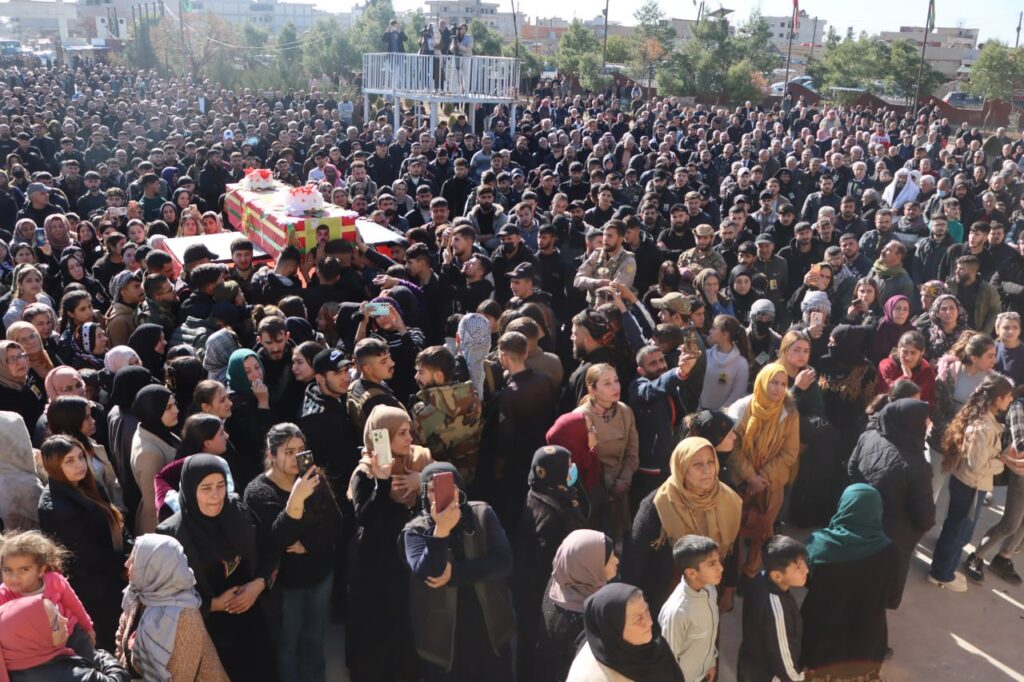
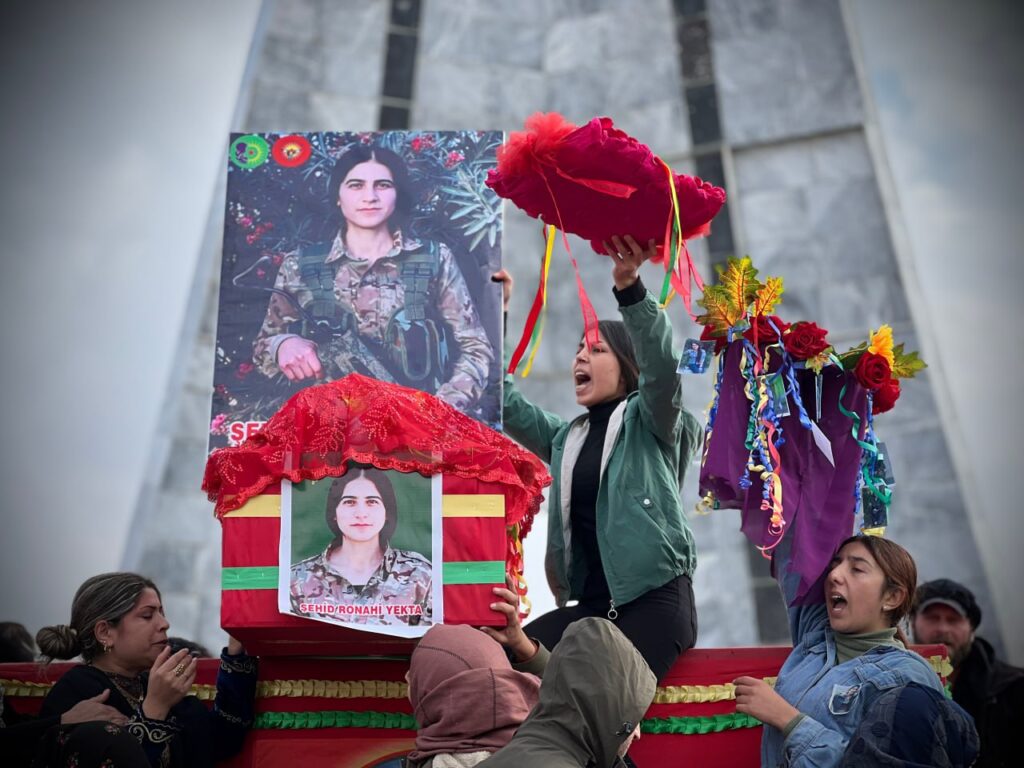
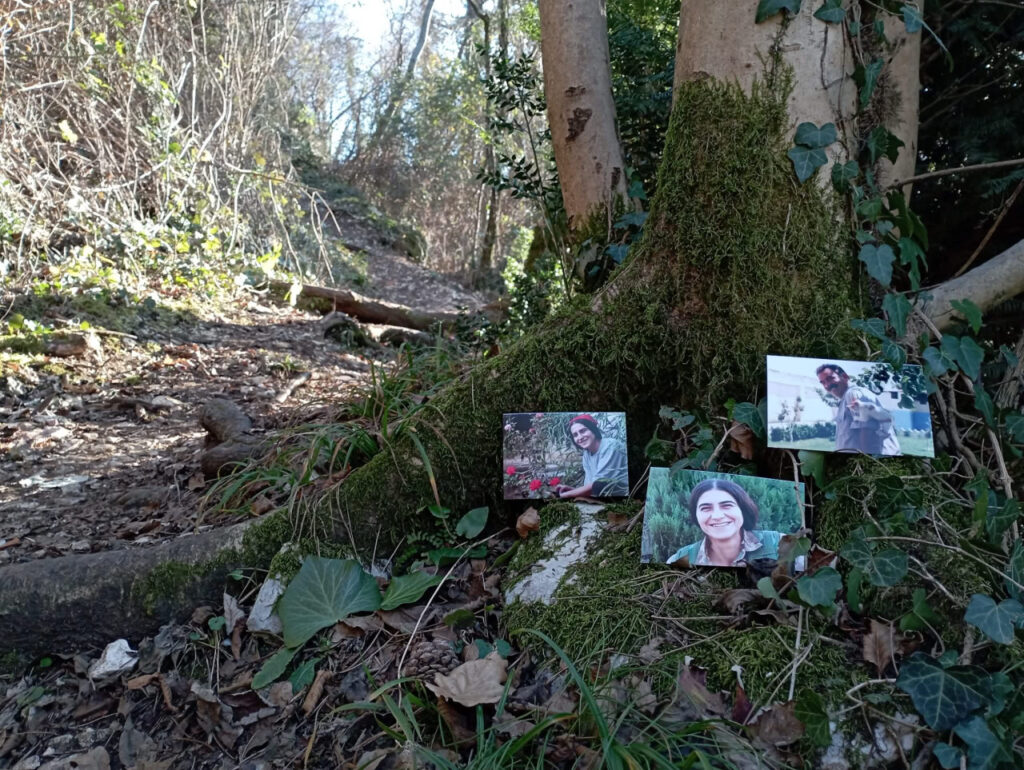
Şehîd Ronahî Yekta was one of the commanders who fell in the resistance of the Tişrîn water dam against the Turkish occupation in December 2024
During the turbulent flow of history from the very beginning until today our heroes have taken many forms. They were the women and young people in Sumerian-era Mesopotamia who refused to accept the advancing shadow of a dominant patriarchal-state mentality, as personified in the legendary fighting between the goddess Inanna and Gilgamesh. They were Jesus and his disciples who formed the first party of the poor against the brutal violence of the ruling Roman empire and their accomplices in the Jewish upper classes, and they were the tens of thousands of wise women who were burnt as ‘witches’ in medieval Europe. In every historical period for those who made a conscious choice to defend the right to a meaningful and full life, different names according to the prevalent ideology were used. Sometimes goddess, other times saint, prophet or wise person were used but mostly today for those who fight for the protection, liberation and freedom of their society we say revolutionary. A true revolutionary personality sees that the individual only has meaning as a part of a free and ethical society and embodies the historical continuity of struggle in the present. Those who can build these principles into the foundations of their identities, understanding that life outside of them will be rendered meaningless, are compelled to struggle accordingly. It is this spirit of unwavering self-sacrifice that allows a revolutionary organization to be accepted as a vanguard and representative of its society.
During the turbulent flow of history from the very beginning until today our heroes have taken many forms. They were the women and young people in Sumerian-era Mesopotamia who refused to accept the advancing shadow of a dominant patriarchal-state mentality, as personified in the legendary fighting between the goddess Inanna and Gilgamesh. They were Jesus and his disciples who formed the first party of the poor against the brutal violence of the ruling Roman empire and their accomplices in the Jewish upper classes, and they were the tens of thousands of wise women who were burnt as ‘witches’ in medieval Europe. In every historical period for those who made a conscious choice to defend the right to a meaningful and full life, different names according to the prevalent ideology were used. Sometimes goddess, other times saint, prophet or wise person were used but mostly today for those who fight for the protection, liberation and freedom of their society we say revolutionary. A true revolutionary personality sees that the individual only has meaning as a part of a free and ethical society and embodies the historical continuity of struggle in the present. Those who can build these principles into the foundations of their identities, understanding that life outside of them will be rendered meaningless, are compelled to struggle accordingly. It is this spirit of unwavering self-sacrifice that allows a revolutionary organization to be accepted as a vanguard and representative of its society.
Against this, the system of Capitalist Modernity in which we live unleashes an endless barrage of special, psychological and emotional warfare aimed at emptying life of all meaning. Through thousands of years of trial and error dominant powers have come to understand that in place of a purely physical violent oppression the best way to suppress a society is to atomize it by cutting it off from its history, culture, land and essential sociality. It is in this way that, more than any previous world system, capitalism dehumanizes us to distance us from struggle. Liberal media and art presents us with a twisted caricature of human relationships that center only personal interest and gain whilst digital media platforms serve to commodity the remnants of human interaction. It is within this system that millions of people find themselves living a serious existential emptiness, unable to give meaning to their now isolated lives. When individuals or small groups attempt to express this discontent they are most often quickly criminalized, violently crushed or become pawns of the very enemy they despise. In this we see the pressing need for organization that can give voice to the anger and will of society as a whole, channeling that will into action. Those who can become the voice and action of a people and play their role in history will find that they have no difficulty in giving meaning to every moment, every breath and every heart beat. This is the role of the revolutionary militant.
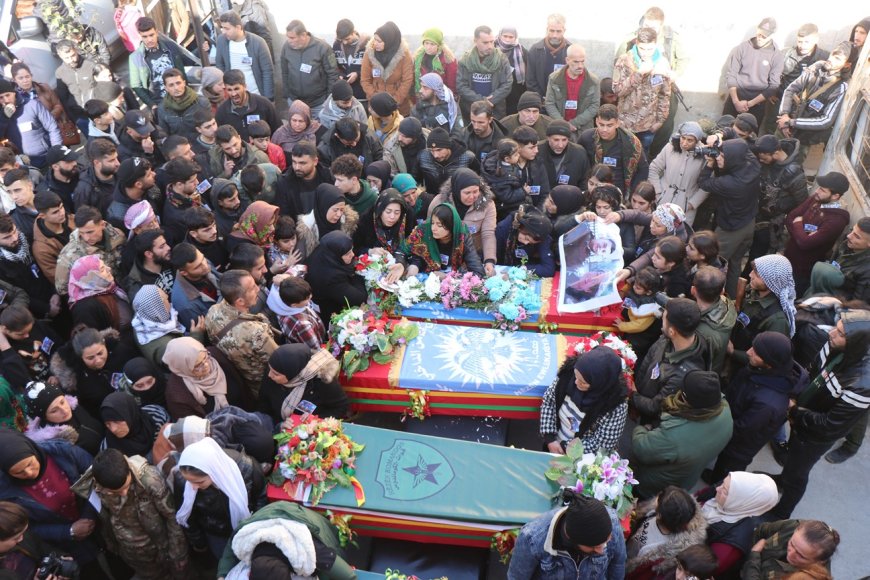
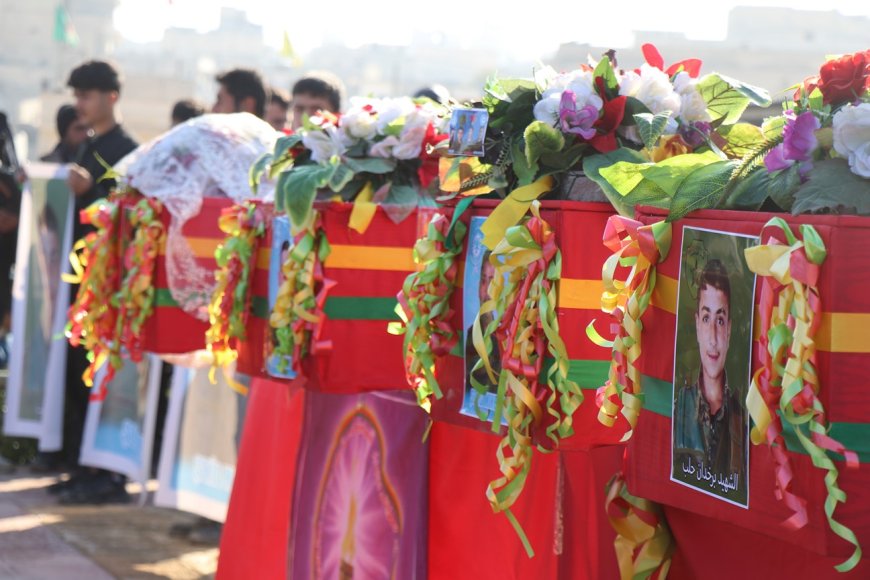
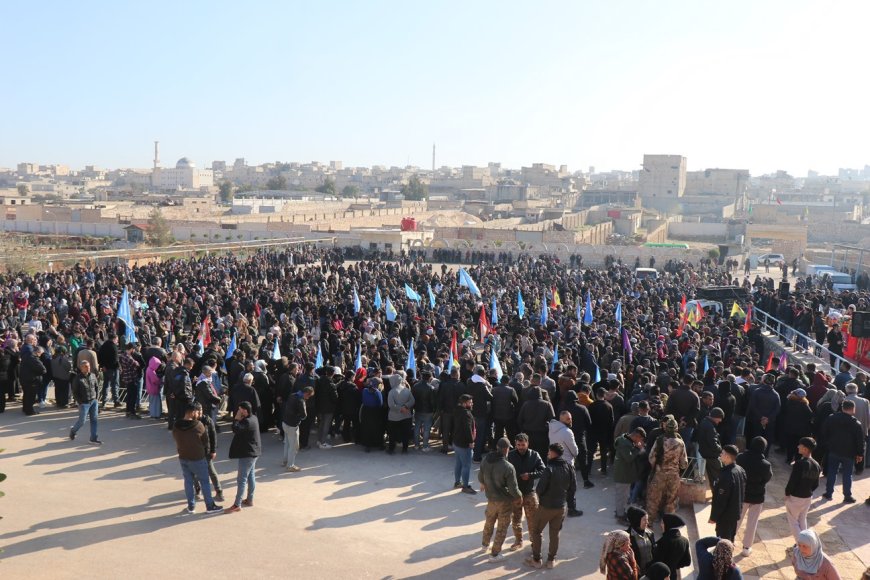
The people of Aleppo are burying their children who gave their lives in the struggle for a free society in January 2025
In the year 1982 the great militant and revolutionary Kemal Pir fell martyr (Şehîd) in the Diyarbakır prison after 55 days on a hunger strike. It was before his martyrdom that when told by a prison guard ‘Just give up, don’t you want to live?’ that Şehîd Kemal answered ‘We love life so much that we are prepared to die for it’. In this one short sentence we can understand how life can be filled with meaning and love. Today in the mountains, planes and cities of Kurdistan and Turkey hundreds of militants have taken up the name of Şehîd Kemal along with the promise to keep his memory alive in their thoughts, actions and struggle and eventually bring it to victory. Capitalist Modernity has built its existence on the denial of love and attempted to liquidate meaning, yet through a deep understanding of the power of sacrifice, Şehîd Kemal was able to grow meaning out of a barren soil of hopelessness, create beauty in the ugliest of places and, most importantly, open the way to even greater resistance.
For nearly 50 years the PKK and the Kurdish Freedom Movement has given tens of thousands of its most precious militants as martyrs in the fight for freedom and humanity. The most beautiful young women and men that you could ever know laid aside all personal interest with no expectation of anything in return other than the belief that we can build a more beautiful life. With their actions they proved that humanity is not condemned to selfishness and individualism. For someone who is not familiar with the PKK it could be asked how someone can live on under the weight of losing countless numbers of their closest friends and comrades. The truth is that if we express martyrdom simply as a loss or if we approach it from an individualistic basis the pain would be enough to tear anyone apart. It is precisely because of this that a revolutionary must have a deep understanding of the necessity of sacrifice for the progression of struggle. The greatest expression of this can be seen in the personality of Rêber APO (Abdullah Öcalan). Rêber APO despite having many of his closest friends and comrades, those who played critical roles in the earliest days of the building of the movement that would go on to become the PKK, fall as martyrs never took a single step backwards. On the contrary he turned each and every martyred comrade, from those he knew to those he had never seen, into a force that drives us towards freedom and victory. To be worthy of their memories and realize their dreams in reality becomes the very essence of life itself. The example set by Rêber APO teaches us to be loyal and draw strength and inspiration from our fallen comrades in the darkest and most painful times of the struggle. The worth of our lives can be measured by the extent to which we are able to fill them with meaning, which can only be achieved by living in pursuit of truth, beauty and freedom. A life without freedom, far from truth or beauty is the most painful form of death, whilst to give your life in service of these principals lifts a person to immortality. No longer living in a single moment but in all of history and into the future, no longer as an individual but as all of society.